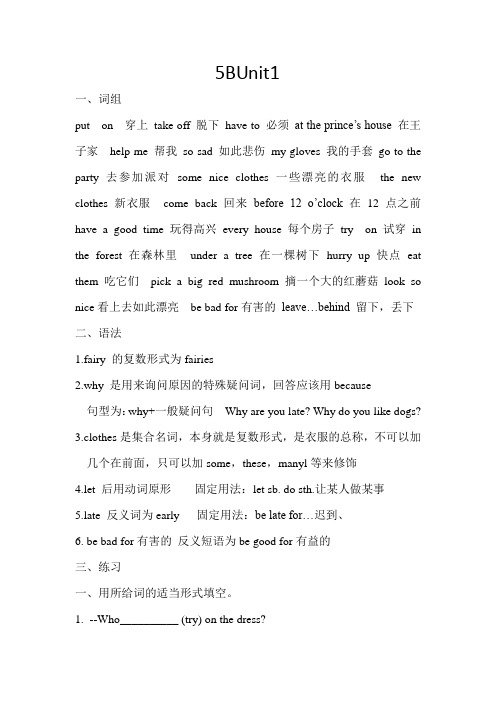第一单元语法小结
七年级下册第一单元的语法

七年级下册第一单元的语法七年级下册第一单元的语法通常涉及一般现在时(Present Tense)的使用。
一般现在时用于描述经常发生的动作或存在的状态,以及普遍的事实和真理。
以下是一些关于一般现在时的重要语法点:1.动词形式:o当主语是第三人称单数(he/she/it)时,动词需要加上-s或-es。
例如:He eats apples.(他吃苹果。
)o当主语是复数形式(they/we/you)或第二人称单数(you)时,动词保持原形。
例如:We like music.(我们喜欢音乐。
)2.Be动词的形式:o当主语是第一人称单数(I)时,使用am。
例如:I am happy.(我很开心。
)o当主语是第三人称单数(he/she/it)时,也使用is。
例如:She is smart.(她很聪明。
)o当主语是复数形式(they/we/you)时,使用are。
例如:They are friends.(他们是朋友。
)3.否定句和疑问句:o否定句:在be动词或助动词(如do/does)后面加上not。
例如:She does not like oranges.(她不喜欢橙子。
)o疑问句:将be动词或助动词提到主语前面,并加上问号。
例如:Do you speak English?(你会说英语吗?)4.频度副词:o一般现在时常常与频度副词一起使用,如always(总是)、usually(通常)、often (经常)、sometimes(有时)、never(从不)等。
例如:I often watch TV.(我经常看电视。
)5.时间状语:o一般现在时的时间状语通常包括always, usually, every day, once a week, in the morning/afternoon/evening等,表示动作或状态发生的频率或时间。
在七年级下册第一单元中,学生通常会通过课文、对话和练习来学习和巩固这些语法点,以提高他们的英语交流能力。
人教版英语六年级下册第一单元知识点总结(一)

人教版英语六年级下册第一单元知识点总结(一)前言本文是对人教版英语六年级下册第一单元知识点的总结文稿。
第一单元主要涉及到词汇、语法和听力等方面的内容。
以下是对这些知识点的详细总结。
词汇1.单词拼写:单词的正确拼写是学习英语的基础,需要认真掌握。
2.词汇量扩展:多记一些常用表达,提高自己的词汇量。
语法1.一般现在时:一般现在时表示经常的或者普遍的动作或状态。
2.一般过去时:一般过去时表示过去发生的动作或状态,常常使用过去式的动词。
3.一般将来时:一般将来时表示计划中的动作或预测的未来情况。
听力1.听力理解:能听懂并理解音频内容的能力是英语学习的重要一环。
2.听力练习:通过多做听力练习,提高自己的听力水平。
正文在第一单元的学习过程中,我们需要重点关注以下几个方面的内容:词汇的掌握•认真记忆单词的拼写和意义,通过反复的复习,加深记忆。
•扩展词汇量,记忆一些常用的表达,让自己的词汇更丰富。
语法的运用•一般现在时的使用:用于描述经常性的或者普遍的动作或状态。
•一般过去时的使用:用于描述过去发生的动作或状态,需要使用过去式的动词形式。
•一般将来时的使用:用于表示将来计划中的动作或预测的未来情况。
听力能力的提高•提高听力理解能力:通过多听多练,逐渐提高自己的听力水平。
•做听力练习题:通过做听力练习题,锻炼自己的听力技巧和反应能力。
结尾通过学习本文所总结的知识点,我们能够更好地掌握人教版英语六年级下册第一单元的内容。
词汇、语法和听力等方面的知识都是学习英语的基础,希望大家能够通过努力学习,不断提高自己的英语水平。
加油!前言本文是对人教版英语六年级下册第一单元知识点的总结文稿。
第一单元主要涉及到词汇、语法和听力等方面的内容。
以下是对这些知识点的详细总结。
词汇•单词拼写:单词的正确拼写是学习英语的基础,需要认真掌握。
•词汇量扩展:多记一些常用表达,提高自己的词汇量。
语法•一般现在时:一般现在时表示经常的或者普遍的动作或状态。
译林版五年级英语下册第一单元词组语法知识点总结及练习

5BUnit1一、词组put on 穿上take off 脱下have to 必须at the prince’s house 在王子家help me 帮我so sad 如此悲伤my gloves 我的手套go to the party 去参加派对some nice clothes 一些漂亮的衣服the new clothes 新衣服come back 回来before 12 o’clock 在12点之前have a good time 玩得高兴every house 每个房子try on 试穿in the forest 在森林里under a tree 在一棵树下hurry up 快点eat them 吃它们pick a big red mushroom 摘一个大的红蘑菇look so nice看上去如此漂亮be bad for有害的leave…behind 留下,丢下二、语法1.fairy 的复数形式为fairies2.why 是用来询问原因的特殊疑问词,回答应该用because句型为:why+一般疑问句Why are you late? Why do you like dogs?3.clothes是集合名词,本身就是复数形式,是衣服的总称,不可以加几个在前面,只可以加some,these,manyl等来修饰4.let 后用动词原形固定用法:let sb. do sth.让某人做某事te 反义词为early 固定用法:be late for…迟到、6. be bad for有害的反义短语为be good for有益的三、练习一、用所给词的适当形式填空。
1. --Who__________ (try) on the dress?-- My sister.2.The prince__________ (come) and (visits) every house.3.I like (eat) apples.4. Cinderella_________ (try) on the shoes.5. --Who_______ (pick) these mushrooms?-- My mother.6.I want ________ (try) on this skirt7.--_______(be) you late for the party?-- No, I’m not.8.Liu Tao (not play) basketball well.二、按要求改写句子。
(完整版)八年级上册第一单元英语语法、短语和知识点总结

八年级上册英语语法、短语和知识点总结Unit 1 Where did you go on vacati on?本单元的话题:谈论假期活动内容,复习一般过去时。
本单元的语法:1.复习一般过去时;2•学习不定代词和不定副词的用法。
语法: 1•本单元出现的动词不规则过去式有:is\am---was 是;are -- were 是;go---went 去;buy —bought买;take ---took拿走;do\does —did 做;feed—fed喂;see —saw看见;eat --ate 吃;have\has —had 有、吃;feel -felt 感觉;ride —rode 骑;get --got 到达,得到;can — could 能、会;forget —forgot 忘记;drink —drank 喝;find —found 找到2. 不定代词和不定副词的用法:some bodyany oneevery thingno where (疑问副词)不定代词和不定副词(1)左边的some、any、every、no 与右边的body、one、thing 构成不定代词,some、any、every、no与右边的疑问副词where 构成不定副词;(2)—般情况下以some开头的不定代词和不定副词用于肯定句,以any开头的不定代词和不定副词用于否定句、疑问句;以no开头的不定代词和不定副词表示否定含义(no one为两个单词);(3)不定代词或不定副词和形容词连用时,形容词放在后面。
He has something important to do. 他有重要的事情要做。
(肯定句用something,形容词important 放后)Did you buy anything special?(一般疑问句用anything,形容词special放后)Did you go any where interesting last mon th? 上个月你去令人感兴趣的地方了吗?(一般疑问句用不定副词anywhere,形容词interesting 放后)(4)不定代词和不定副词做主语时,后面的动词用单数形式。
人教版高中英语必修一第一单元语法

注意
▪ 主从复合句的直接引语变为间接引语时, 从句中的一般过去时通常不变为过去完成 时。
人称变化
直接 引语 代词
I we you me us this these
间接
引语 he/ they I him/ them that those
代词 she
her
He said,“I like it very much.”
He said that he liked it very much.
He said to me,“I’ve left my book in your room.”
He told me that he had left his book in my room.
直接引语中的状语
状 语
now
变 ago
一般过去时 过去进行时 过去完成时 过去将来时 过去完成进行时 过去完成时
直接引语变间接引语时态不变的情况
✓当直接引语是客观真理时。
✓当直接引语中有具体的过去某年、某月、某日作状 语时。 ✓当直接引语是过去完成时态时。 ✓当主句谓语动词是一般现在时、现在完成时、一般 将来时态时。
✓当直接引语表示的是谚语或名人名言时。
✓当直接引语表示客观的时刻表时。
He said, “The earth goes around the sun.”
He said that the earth goes around the sun.
Mr. Wang said, “I was born in China in September,1972. ”
She said that she would finish her work the next day.
高一英语必修一第一单元重点语法及知识点

高一英语必修一第一单元重点语法及知识点以下是人教版高一英语必修一第一单元重点语法及知识点:- 重点词汇和短语:- add up- upset- ignore- calm down- have got to- concern- go through- set down- a series of- on purpose- in order to- at dusk- face to face- no longer- settle- suffer- recover- get/be tired of- pack- get along with- fall in love- disagree- join in- 重点句型:- It was the first time in a year and a half that I had seen the night face to face.- I wonder if it’s because I haven’t been able to be outdoors for so long that I’ve grown so crazy about everything to do with nature.- I stayed awake on purpose until half past eleven one evening in order to have a good look at the moon for once by myself.- If you have some trouble getting along with your friends, you can write to the editor and ask for advice.- Add up your score and see how many points you can get.- What he did has added to our difficulties.- His income adds up to $1000 a month.- It' s no pleasure looking through these any longer because nature is one thing that really must be experienced.- Why is she so concerned about his attitude to her work?- The police asked him to set down what he had seen in a report.- As I was about to go out and search for him, he happened to come in.- Mr. Jones lives alone and often feels lonely.- We tried to calm him down, but he kept crying.- Does he dare (to) go out at night in such stormy weather?- He would go through fire and water for his country.- That country suffered a heavy loss in the flood.- 语法总结:- 直接引语和间接引语(一)- 直接引语:直接引述别人的原话。
新高一第一单元语法知识点
新高一第一单元语法知识点随着新学年的开始,新高一的学生们都将开始接触到更加深入的语法知识。
语法在英语学习中扮演着非常重要的角色,它是理解和运用英语的基础。
在本文中,我们将介绍新高一第一单元的一些重要语法知识点,帮助大家更好地掌握英语语法。
主谓一致主谓一致是英语语法中的一个基本原则。
它指的是主语和谓语在人称和数上要保持一致。
例如,当主语是第三人称单数时,谓语动词要加上-s或-es的形式。
例如,Tom reads books every day. 在这个句子中,主语Tom是第三人称单数,所以谓语动词read要变成reads。
时态的正确使用时态是描述动作或状态发生时间的一种语法形式。
在英语中,时态的正确使用非常重要,可以使句子的意思更加清晰明了。
在新高一第一单元中,我们将涉及到一些基本的时态,如一般现在时,一般过去时和将来时。
例如,I go to school every day. 在这个句子中,使用的是一般现在时,表示的是经常性的动作。
另一个时态的使用是一般过去时。
它用于描述过去发生的事情或情况。
例如,I watched a movie yesterday. 在这个句子中,使用的是一般过去时,表示的是发生在过去的一个具体时间点的动作。
最后,我们还将学习将来时的用法。
将来时用于描述将来要发生的动作或情况。
例如,I will visit my grandparents next week. 在这个句子中,使用的是将来时,表示的是将来某个时间会发生的动作。
比较级和最高级比较级和最高级是用于比较和描述事物之间差异的形式。
在新高一第一单元中,我们将学习如何正确使用比较级和最高级。
当我们要比较两个事物时,我们使用比较级。
例如,Tom is taller than John. 在这个句子中,使用了比较级形式的taller来表示Tom比John更高。
最高级用于描述三个或三个以上事物之间的差异,表示最高的程度。
例如,Tom is the tallest boy in the class. 在这个句子中,使用了最高级形式的tallest来表示Tom是班里最高的男孩。
人教版八年级下册英语Unit1知识点语法归纳总结
⼈教版⼋年级下册英语Unit1知识点语法归纳总结Unit 1 What’s the matter?1.短语归纳2.典句必背3.⽤法集萃(1)当别⼈⼼情不好,⾝体不适或遇到⿇烦时,我们可以⽤如下表达表⽰关⼼:?What’s the matter? What’s the matter with youWhat’s wrong with …What’s the trouble\problem with …(2)英语中常⽤have描述⾝体的不适,此时have意为“患有”,常⽤结构:①have a + 疾病例:have a cold 感冒;have a fever 发烧;have a cough 咳嗽②have a + ⾝体部位-ache例:have a headache 头痛;have a toothache ⽛痛③have a sore + ⾝体部位例:have a sore throat 咽喉痛;have a sore back 背痛(3)lie down躺下;tell lies/a lie 说谎(4)maybe & may be①maybe,“或许”,常⽤于句⾸,表⽰可能性,后加句⼦。
例:Maybe you are right.②may be,是情态动词+be的结构,意为“可能,也许”,后加名词、代词或形容词。
例:He may be angry.(5)sound like & sound①sound like+名词/代词/从句例:It sounds like you don’t know the truth. It sounds like a good idea.②sound+形容词,“听起来,好像”,例:The music sounds nice.(6)…when the driver saw an old man lying on the side of the road. ……这时司机看到意为⽼⼈躺在路边。
新概念英语一册语法总结
新概念英语一册语法总结.doc新概念英语第一册语法总结引言《新概念英语》第一册作为英语学习的入门教材,为学习者提供了基础的语法知识。
本文旨在总结第一册中的语法要点,帮助学习者更好地理解和掌握英语语法。
第一单元:基本句型陈述句肯定句:主语 + 动词 + 其他否定句:主语 + 助动词(do/does)+ not + 动词原形 + 其他一般疑问句结构:助动词(do/does)+ 主语 + 动词原形 + 其他?回答:Yes, 主语 + 助动词. / No, 主语 + 助动词 not.特殊疑问句结构:疑问词 + 助动词 + 主语 + 动词原形 + 其他?第二单元:时态一般现在时表示经常发生的动作或状态动词变化:S + V(原形)/ V(第三人称单数)现在进行时表示正在进行的动作结构:S + am/is/are + V-ing一般过去时表示过去发生的动作或状态结构:S + V-ed(规则动词)/ 特殊形式(不规则动词)现在完成时表示过去发生的动作对现在有影响或结果结构:S + have/has + V-ed第三单元:名词可数名词规则复数:名词 + -s或-es不规则复数:特殊形式不可数名词通常没有复数形式名词所有格表示所有关系:名词's 或 of 结构第四单元:代词人称代词主格:I, you, he, she, it, we, they宾格:me, you, him, her, it, us, them物主代词形容词性物主代词:my, your, his, her, its, our, their名词性物主代词:mine, yours, his, hers, its, ours, theirs 反身代词myself, yourself, himself, herself, itself, ourselves, themselves第五单元:形容词和副词形容词描述名词的性质或特征副词描述动词、形容词或其他副词比较级和最高级规则形式:比较级 -er, 最高级 -est不规则形式:特殊形式第六单元:介词时间介词in, on, at地点介词in, on, at, above, below, beside, behind, in front of方式介词by, with, through第七单元:连词并列连词and, but, or, yet, for, nor, so从属连词that, if, whether, who, what, where, when, how第八单元:冠词不定冠词a, an定冠词the零冠词在某些情况下可以省略冠词结论《新概念英语》第一册为英语学习者提供了扎实的语法基础。
人教版英语八年级下册Unit 1 第一单元语法复习
第一单元语法复习1. 情态动词should的用法(1)情态动词should意为“应该”,后跟动词原形,表示责任和义务。
变为一般疑问句时将should提前,变为否定句时在should后面加not。
其结构为:主语+should/shouldn't(shouldn't =should not不应该)+动词原形。
如:①You should lie down and rest.你应该躺下休息。
②He shouldn't go to school when he has a cold.他感冒时不应该去上学。
( 2 ) should 常用于以下两种情况:①提出建议、观点或看法。
You look tired.You should lie down and rest.你看起来很疲惫,你应该躺下休息。
②表示推测,意为“应该,按理应当”。
Wait a minute. I think he should come in a moment.请稍等一下,我想他应该马上过来。
【拓展】在英语中,表示建议的说法有很多,而且都是中考观察的重点。
主要结构有:①Would you like (to do) sth . ?你想要/愿意(做)某事吗?Would you like to play basketball with me?你想要和我一起打篮球吗?②Shall l/we do sth ?我/我们做,,好吗?Shall we go to the zoo tomorrow?明天我们去动物园,好吗?③Why not do sth ? 为什么不,,呢?Why not join us?为什么不加入到我们中间来呢?④How/What about doing sth ?做某事怎么样?How about going swimming?去游泳怎么样?⑤Let’s do sth让我们做,,吧。
Let ' s go home .我们回家吧。
- 1、下载文档前请自行甄别文档内容的完整性,平台不提供额外的编辑、内容补充、找答案等附加服务。
- 2、"仅部分预览"的文档,不可在线预览部分如存在完整性等问题,可反馈申请退款(可完整预览的文档不适用该条件!)。
- 3、如文档侵犯您的权益,请联系客服反馈,我们会尽快为您处理(人工客服工作时间:9:00-18:30)。
1
1、get along=get on相处,进展
例句:He is getting along very well at school.
get相关短语总结:
get sb to do sth使某人去做某事 get over克服 get up起床 get off
下车 get across使理解
例句:She can’t get over her shyness.
He’s not good at getting his ideas across.
2、betray出卖、泄露、辜负、背叛 名词:betrayer背叛者,叛徒betrayal
背叛、暴露
例句:He was offered money to betray his colleagues.
She betrayed his trust over and over again.
She was terrified of saying something that would make her betray herself.
3、primary初步的、初级的;第一位的、主要的 副词:primarily主要地、起
初地
例句:The primary aim of this course is to improve your spoken English.
The disease is still in its primary stage.
Primary teachers小学教师
This building was primarily intended to be a dinning hall
4、academic学习良好的;学术的 副词:academically
例句:She wasn’t very academic and hated school.她学习不怎么样,而且讨厌上学。
academic year学年 an academic career学术生涯
5、overlook忽略、忽视、俯瞰
例句:He seems to have overlooked one important fact.
A restaurant overlooking the lake一家濒湖餐厅
She’s been overlooked for promotion several times.
6、admit承认、接受、准许进入admitting;admitted
例句:admit to doing sth;admit to sth
She admits to being strict with her children.
Don’t be afraid to admit your mistakes.
She stubbornly refuses to admit the truth.(直接加宾语)
Each ticket admits one adult and one child.
admit to/into
Women were only admitted into the club last year.
2
7、deliberately=on purpose故意地 by chance=by accident碰巧、偶
然
例句:She’s been deliberately ignoring him all day.
He packed his up possessions slowly and deliberately.小心翼翼地、不慌不忙
地、从容不迫地
8、swear诅咒、发誓
例句:Why did you let him swear at you like that?
She made him swear not to tell anyone.
swear to sb on sth
9、forgive原谅、宽恕
例句:forgive sb for doing sth
Forgive me for interrupting, but I really don’t agree with that.
10、 tease嘲笑、取笑
例句:She takes delight in teasing her younger sister.
He hates to be teased about his balding head.
11、 dilemma困境,进退两难的局面
例句:This places him in a dilemma.
face a dilemma be in a dilemma
12、 focus 集中、焦点、中心concentrate on
例句:Today we're going to focus on the question of homeless people in London.
focus one's attention on sb (sth)集中注意力于某事
Her beauty makes her the focus of attention.
The image goes out of focus.这影像未对准焦距。
We must concentrate our efforts on improving education.
13、mean意思是;打算;吝啬的;卑鄙的;邪恶的;丑陋的
例句:He didn't mean to hurt you.
What do you mean by saying that?
This new order will mean working overtime.
be mean to sb 对某人刻薄 be mean with sth对某物吝啬
14、 cruel残忍的
例句:I can’t stand people who are cruel to animals.
15、stand容忍
例句:My tooth is killing me. I can't stand it.
stand for代表,代替,象征,支持,做...的候选人
3
stand out站出来,突出,坚持抵抗,显眼,引人注目
16、 apologize 道歉,抱歉
例句:You must apologize to him for your fault.
I must apologize for not being able to meet you.
17、blame责备,责怪,把…归咎于
例句:Take the blame担负过失的责任
blame sb/sth for sth=blame sth on sb/sth
She doesn’t blame anyone for her father’s death.
Police are blaming the accident on dangerous driving.
be to blame负有责任
Which driver was to blame for the accident?
18、doubt怀疑、疑惑
例句:There is some doubt about the best way to do it.(名词加about)
The success of the system is not in doubt.
There seems no reason to doubt her story.(动词不加介词)
19、jealous妒忌的、羡慕的
例句: He was jealous of his friend's reputation.
They may feel jealous of his success.
20、embarrass 使窘迫, 使尴尬, 使为难
例句:I don't like making speeches in public; it's so embarrassing.
She was embarrassed when they asked her age.
You didn't embarrass me in the slightest
21、gifted有天赋的、有才华的
例句:a gifted player天生的
He is gifted for art.有才华的
He was gifted with a charming smile.(具有)
He has the gift of making friends easily.
She has a great gift for music.
